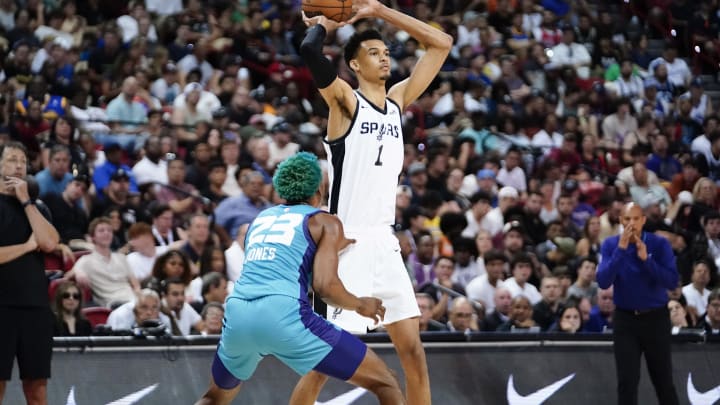How Should We Really Gauge Summer League?

In this story:
Summer League is a yearly overreaction to rookies - both good and bad - where instant gratification has taken a floor seat, and measured expectations are outside the the campus of UNLV, melting in the desert sun.
What happened to Victor Wembanyama the other night is nothing but another chapter in a rich tradition of highly selected draft picks "disappointing" in the extremely early stages of their NBA careers, mere weeks after getting their names called.
Derrick Rose couldn't string together two good games during Orlando Summer League in 2008, while the player selected right after him - Michael Beasley - looked like a future All-Star.
The Golden State Warriors brought Anthony Randolph to Las Vegas the year after, where he scored 42 points against the Chicago Bulls in his opening game. By 25, Randolph was out of the league.
Summer League is, broadly, the research and development department of the NBA. It's fun to test out new stuff, but don't expect immediate results. The final product is eons away.
If this reads as a defense of Wembanyama, and everyone else not meeting expectations, it's because it is. As an NBA society we tend to put way too much stock into the production of Summer League, dreaming of future stardom when we see a team's 55th selection perfectly execute one pick-and-roll, and the 47th pick catch the alley-oop pass. Surely they're the next Gary Payton and Shawn Kemp, because nothing less could ever do.
We need to separate fun and honest expectations from Summer League. Seasoned fans fortunately are very much aware that success, or struggles, doesn't need to have any correlation to a player's actual NBA career.
So, you might be wondering, is NBA Summer League meaningless?
The answer is a combination of yes and no. It's pointless if what you're trying to take away from it is substantial evidence of a player's abilities or readiness for the league at large.
It's not meaningless if what you're taking away from it is the experience of seeing a player for the first time in a new environment, intrigued to see how he responds to it.
But how he responds to it is nothing but a quick snapshot of the presence. If you accept that premise, I have good news! Summer League is for you. Please indulge to your heart's content.
Now, for teams, Summer League can be useful in a variety of ways. The games themselves aren't that important, but for coaching staffs to see their new selections behind the scenes, on the practice court with teammates, the time spent with these guys is invaluable.
They learn how a guy is wired. How he thinks. How he interacts. Does he have humor? Is he putting too much pressure on himself? What do we need to work on before training camp?
Coaches and organizations come away with a whole new book on each new player they've brought to Summer League, and that's by far the most crucial aspect of the entire event.
You think the Spurs would hit the panic button if they lose their remaining games? Or they'd take trade calls on Wembanyama if he struggles during his entire Las Vegas stay? Think again.
No, instead the Spurs - like every other franchise - would assess the event, compare notes, initiate dialogue with their players, and spend the entirety of August and most of September getting ready for training camp, at which point Summer League will be long gone, a relic of the past.
So let's approach Summer League as it's meant to be: A fun break from the nothingness between seasons, where everything you see is NBA teams giving you an inner glimpse of their R&D department.
Unless noted otherwise, all stats via NBA.com, PBPStats, Cleaning the Glass or Basketball-Reference. All salary information via Spotrac. All odds courtesy of FanDuel Sportsbook.
Want to join the discussion? Like Draft Digest on Facebook and follow us on Twitter to stay up to date on all the latest NBA Draft news. You can also meet the team behind the coverage.

Morten has managed to create a stable career for himself, launching Denmark's first weekly NBA radio show, and co-hosting a weekly NBA TV show. He's a seasoned basketball analyst and is experienced covering the league and its upcoming prospects.
Follow msjnba